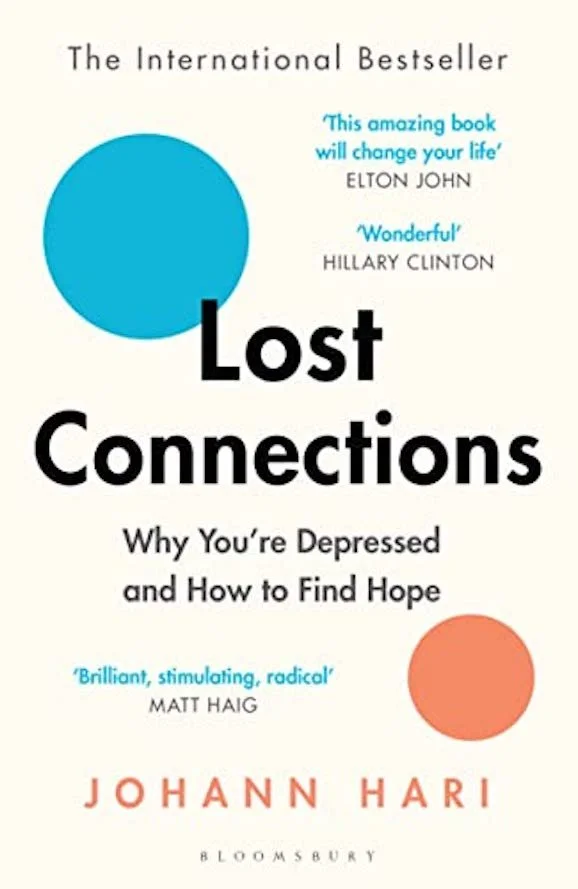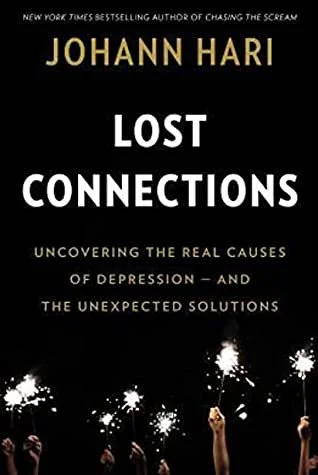Book Review - Lost Connections - Johann Hari
“What if depression is, in fact, a form of grief—for our own lives not being as they should? What if it is a form of grief for the connections we have lost, yet still need?”
Johann Hari’s ‘lost connections’ is an investigation into depression and it’s causes, and ultimately what we can do find hope. By using research and statistics, and visiting a range of people and communities around the world, he sets out to show that it’s not chemical imbalance that causes depression but a lack of connection.
Part one - Challenging the narrative
I first came across Johann Hari during an interview with Sam Harris on the excellent ‘Making sense’ podcast. I found what he had to say about Depression to be fascinating , and he was able to back up a lot of what he said with research. I picked up the book, where it took it’s place on my TBR shelf. I eventually got to it.
Hari took his first anti-depressant at the age of 18 and had completely accepted the narrative that his illness was caused by a chemical imbalance in the brain. He visits doctors and highlights research which show that it’s not as clearcut as that. The arguments and statistics he presents are powerful ones and it’s hard to disagree with any of it.
Serotonin
Only last week I read an article about how there is no convincing evidence that a lack of serotonin causes depression, so a lot of this information is now in the mainstream. Parts of this section made me quite angry, as it feels a narrative has been forced on us that’s not entirely true. Yet again it seems we’ve been misled by the pharmaceutical companies.
If you have taken anti-depressants in the past, a lot of what Hari is talking about in ‘lost connections’ is quite challenging. I began to wonder just how big a part of the problem some of these medications are. If they work so well, why do patients have to continually increase their dosage, or switch to other brands, or have to keep returning to take them again. If they’re fixing brain chemicals, surely we shouldn't have to keep taking them again.
Well researched and argued, it was hard to disagree with any of what the author was saying and I was eager to get onto the next section.
Part 2 - Nine causes of anxiety and depression
In this section Johann Hari lists nine causes of depression and anxiety. Disconnection is the thread here - from other other, from meaningful work, meaningful values, childhood trauma, status and respect, the natural world, a hopeful and secure future, and the real roles of genes and brain changes.
When you read some of the case studies, such as that of people in dead end jobs, it’s not surprising that it leads to depression. Some of the research findings are shocking - for example, being acutely lonely causes as much stress as being on the end of a physical attack.
Loneliness
I don’t usually dog ear my pages, but I did it so much in ‘lost connections’. The chapter on disconnection from other people I found fascinating. Lonely people are hyper-vigilant because they know no one is looking out for them, and they become suspicious of strangers and shut down socially, which is the opposite of what they need. Lonely people become harder to be around, and retreat further from the world.
“Loneliness isn’t the physical absence of other people, he said—it’s the sense that you’re not sharing anything that matters with anyone else. If you have lots of people around you—perhaps even a husband or wife, or a family, or a busy workplace—but you don’t share anything that matters with them, then you’ll still be lonely.”
(Another book I read this year which also issued a warning about the growing levels of loneliness in society was ‘The lonely century' by Noreen Hertz.)
Part Three - Reconnection
I found the third section of ‘lost connections’ to be a powerful one, as it lays out ways in which people have reconnected.
Some doctors, such as those at Bromley-by-bow, believe that although anti-depressants have a part to play, have an approach called ‘social proscribing’ where patients are connected to one another via a hub, engaged in gardening and painting and other social activities.
A functioning welfare state and a universal basic income are also suggestions that Hari believes would work. Not the first time I’d read the of the value of a universal basic income, also covered in Rutger Bregman’s excellent ‘Utopia for realists’.
Connections
Sam, one of the doctors, believes the effects on patients are better than that from pharmaceuticals, but of course there’s no money to be made from connecting people. By simply asking people ‘what matters to you?’ rather than ‘what is the matter with you?’, they feel they can tackle the root of the problem rather than papering over the cracks
It seems that it’s only by meeting peoples emotional needs, that we’ll be able to heal society. But while there’s huge profits in the pharmaceutical industry, it seems unlikely that governments will pivot to a different approach.
Summary
Depression and Anxiety, as Johann Hari states in ‘lost connections’, have three causes; Biological, social and psychological. A chemical imbalance can’t account for all of these, and it seems we need to change our approach.
Just like a bee needs a hive, a human needs a tribe.
We need community, and our emotional needs to be met if we are to heal. We are living in a society that is making us sick. We have been looking for the answers in the wrong places.
I found this an incredibly powerful book. It was incredibly well researched and always informative, using a wide range of case studies. I’ve read a lot of books about depression and anxiety and I’d say this one is up there with the best of them.
“You aren’t a machine with broken parts. You are an animal whose needs are not being met. You need to have a community. You need to have meaningful values, not the junk values you’ve been pumped full of all your life, telling you happiness comes through money and buying objects. You need to have meaningful work. You need the natural world. You need to feel you are respected. You need a secure future. You need connections to all these things. You need to release any shame you might feel for having been mistreated.”
Lost connections by Johann Hari
380 Pages
Bloomsbury January 11 2018



